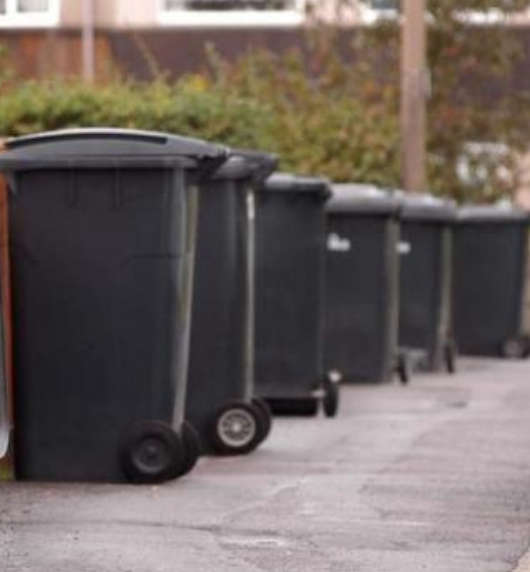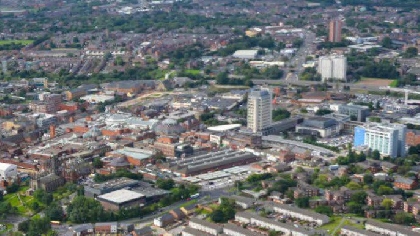
Bin collections are being reviewed by town hall chiefs in response to government initiatives to hit recycling targets, as well as the pressure of tightening budgets.
Many authorities are planning to cut back on the frequency of collecting non-recyclable household waste, which in many areas is placed in black or grey wheelie bins.
At least ten councils are planning to switch from fortnightly to three-weekly collections of general household waste in the next few months.
This includes both Blackpool and Lancaster from April 2026.
In Greater Manchester, five councils, Bury, Salford, Oldham, Rochdale and Wigan already operate three-weekly general waste collections and have done for several years, some introducing the change as far back as 2015.
The five other city region authorities, Manchester, Tameside, Trafford, Bolton and Stockport, operate general waste collections every two weeks and none of them have announced any changes to this level of service
The data reveals that a total of more than 40 local authorities in the UK will have the reduced service in place by the end of next year as the policy spreads to more areas. You can see all the areas affected in this interactive map:
Councils in England are bringing in changes ahead of the government’s “Simpler Recycling” legislation which will require local authorities to meet more stringent recycling requirements by March 2027.
The policy was published in November last year, with the government declaring that it would help solve the ‘muddled and confusing patchwork of approaches’ to bin collections.
But it did not include a rule which Rishi Sunak’s government had proposed, requiring councils to ‘provide a minimum standard of a fortnightly collection’ for residual waste – opening the way for more local authorities to move to three-weekly collections. Earlier this week West Berkshire became the latest area to switch to collecting non-recyclable waste every three weeks instead of fortnightly.
Councillor Stuart Gourley, in charge of environmental issues at the authority, said: “We’re seeing some new government legislation coming in 2027/28 and if we carry on doing what we’re doing now, we could end up with an extra £1.4m bill to pay.”
Recycling and waste collection policy is overseen by the devolved governments in Scotland, Wales and Northern Ireland. More than half of local authorities in Wales already have three-weekly collections for non-recyclable waste – Wales has the highest recycling rates in the UK and the Welsh government is aiming to be a ‘zero waste’ nation by 2050.
Last year, the Scottish government passed a Circular Economy Act which set new targets for local authorities on household waste and recycling. In four UK council areas – Clackmannanshire and Falkirk in Scotland and Conwy and Denbighshire in Wales – general household waste bins are now collected every FOUR weeks, and another council – East Ayrshire – will also move to the four-week schedule from May next year.
Of the 362 waste collecting local authorities in the UK, the majority still have fortnightly bin collections but in the last few months several councils in England have announced plans to move from collecting general waste bin collections every two weeks to once every three weeks.
A survey of waste collecting policies by councils in the UK shows that a total of around 2 million people will be affected by the announced changes and more councils could join the move to collecting waste once every three weeks.
Across the UK, our survey found that there are currently a total of 34 local authorities which collect general waste every three weeks, with a further 10 councils set to join them between now and June 2026. Nine of the ten councils making the change are in England.
It means that by the end of next year nearly one in eight UK local authorities will be collecting general household rubbish less frequently than every two weeks. There are just 12 councils which retain the traditional weekly collection of household waste bins and of these, only two – Portsmouth and Milton Keynes – are outside of central London.
Here is a list of council areas where general, non-recyclable waste household waste is already collected every three weeks, plus areas which have announced plans to move to three-weekly collection in the coming months:
England
North Somerset
West Northamptonshire
East Devon
Mid Devon
North Hertfordshire
Warwick
East Hertfordshire
Bury
Salford
Oldham
Rochdale
Somerset
Wigan
Bracknell Forest
Blackpool (from April 2026)
South Gloucestershire (from May 2026)
West Berkshire (from September 2025)
Cheshire East (from April 2026)
Braintree (from June 2026)
Lancaster (from April 2026)
Mid Suffolk (from June 2026)
Mid Sussex (from November 2025)
East Suffolk (from 2026)
Scotland
Aberdeenshire
Argyll and Bute
East Dunbartonshire
East Renfrewshire
Glasgow
North Ayrshire
North Lanarkshire
South Ayrshire
Moray
West Dunbartonshire (from November 2025)
Wales
Isle of Anglesey
Blaenau Gwent
Flintshire
Gwynedd
Ceredigion
Carmarthenshire
Vale of Glamorgan
Newport
Pembrokeshire
Powys
Rhondda Cynon Taf
*There is no central official record kept of the frequency of non-recyclable waste collections in each local authority in the four nations of the UK, and the above list and map is based on a survey of publicly-declared waste collection policies across 362 waste-collecting authorities.


 Russell Hobbs announces national school campaign
Russell Hobbs announces national school campaign
 Time to deliver on maternity, endo, and other women’s health issues
Time to deliver on maternity, endo, and other women’s health issues
 Fatou’s daughters are growing up on the 409 and 81. No wonder they have headaches
Fatou’s daughters are growing up on the 409 and 81. No wonder they have headaches
 Fire at kids’ home prompts Ofsted inspection
Fire at kids’ home prompts Ofsted inspection

